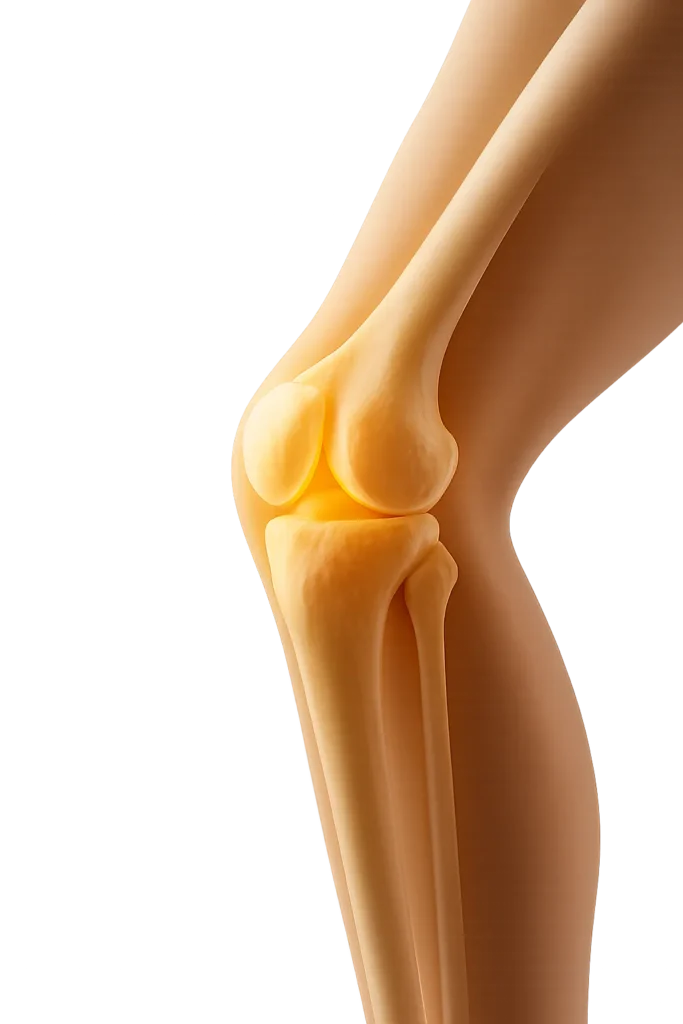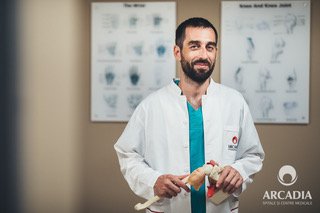Dr. Scorpie, knee & joint specialist
Knee surgery
With years of expertise in knee surgery, Dr. Scorpie treats arthritis, ligament and meniscus injuries, and post-traumatic damage. His approach combines state-of-the-art surgical techniques and individualized rehabilitation plans, aiming to reduce pain, improve mobility, and support patients in regaining their independence and quality of life.

Don’t let knee pain hold you back – regain movement, regain freedom.
Chronic knee pain and severe mobility limitations can have a profound impact on a person’s quality of life. Beyond the persistent discomfort—which can range from mild nuisance to severe, disabling pain—these issues directly affect everyday activities: walking, climbing stairs, standing for long periods, or even getting dressed.
A person suffering from chronic knee pain may gradually become dependent on others, losing autonomy and independence. Functional limitations also affect overall health: reduced physical activity can lead to muscle loss, weight gain, and decreased cardiovascular fitness. Together, these factors create a vicious cycle where pain, immobility, and overall decline reinforce each other.
Early and effective management of chronic knee pain and mobility restrictions not only aims to relieve local symptoms, but also plays a key role in maintaining an active, independent, and fulfilling life, supporting physical, psychological, and social well-being.


The treatment of knee problems ranges from conservative and minimally invasive interventions to knee prosthesis implantation, depending on the severity of joint damage and the patient’s symptoms.
For cases of irreversible joint damage, chronic pain, and significant functional limitation, a knee prosthesis is indicated. The most common indications are:
1. Advanced osteoarthritis (gonarthrosis)
At this stage, the articular cartilage is worn away, leading to bone-on-bone contact between the femur and tibia. Patients experience pain, swelling, stiffness, and major difficulty with walking, climbing stairs, or performing daily activities. Knee replacement relieves pain and restores mobility and function.
2. Rheumatoid arthritis or other inflammatory joint diseases
Chronic inflammation can progressively destroy cartilage and erode bone, sometimes causing joint deformity. When medications and physical therapy fail, a knee prosthesis becomes necessary to relieve pain and improve function.
3. Severe fractures or post-traumatic joint damage
Complex fractures or trauma may make reconstruction or fixation impossible, particularly in elderly patients or those with osteoporosis. Prosthetic replacement restores stability, mobility, and independence.
For patients with less advanced disease or localized damage, less invasive procedures may be considered:
1. Arthroscopic surgery to remove debris, repair or remove damaged tissue, and smooth cartilage surfaces.
2. Osteotomy, which realigns the knee joint to reduce pressure on the damaged area.
3. Partial (unicompartmental) knee replacement, replacing only the affected compartment of the knee while preserving healthy tissue.
Early and appropriate management—whether minimally invasive or prosthetic—aims to relieve pain, restore mobility, and allow patients to maintain an active and independent life.
Surgical Indication and Approach
The decision to perform a knee replacement is based on your symptoms, imaging results, and how the condition affects your daily life and overall quality of life. The main goals are to relieve pain, restore mobility, and help you return to everyday activities. Each procedure is carried out with precision and attention, following established protocols and tailored to your individual needs. My orthopedic experience, regularly updated with the latest techniques, ensures a safe and effective surgery.
After surgery, a multidisciplinary team—including rehabilitation physicians, physiotherapists, anesthesiologists, and internal medicine specialists—works together to support a smooth and rapid recovery.
Preoperative Assessment
A detailed preoperative evaluation is key to planning your surgery accurately. This includes:
1. A thorough clinical examination of the knee
2. Imaging studies such as X-rays, MRI, or CT scans
3. Laboratory tests including blood count, inflammation markers, and kidney/liver function
4. Multidisciplinary consultations if needed
This careful assessment ensures that surgery is the right choice for you, allows us to customize the procedure to your needs, and maximizes the chances of a successful outcome and smooth recovery.

Have Questions ?
